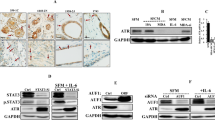Abstract
Background
Stromal fibroblasts influence tumor growth and progression. We evaluated two aldo–keto reductases, AKR1C1 and AKR1C2, in stromal fibroblasts and carcinoma cells as prognostic factors in primary human breast cancer. They are involved in intratumoral progesterone metabolism.
Methods
Immunohistochemistry was performed on tissue microarrays from 504 core biopsies from breast cancer patients. Primary endpoints were disease-free (DFS) and overall (OS) survival.
Results
AKR1C1 and AKR1C2 expression in fibroblasts and tumor cells correlated with favorable tumor characteristics, such as small tumor size and negative nodal status. In univariate analysis, AKR1C1 expression in carcinoma cells correlated positively with DFS und OS; AKR1C2 expression in both fibroblasts and tumor cells also showed a positive correlation with DFS and OS. In multivariate analysis, AKR1C1 expression in carcinoma cells was an independent prognostic marker.
Conclusion
It can be assumed that our observations are due to the independent regulatory function of AKR1C1/2 in progesterone metabolism and therefore provide a basis for new hormone-based therapy options for breast cancer patients, independent of classic hormone receptor status.




Similar content being viewed by others
References
Bauer M, Su G, Casper C et al (2010) Heterogeneity of gene expression in stromal fibroblasts of human breast carcinomas and normal breast. Oncogene 29:1732–1740
Daniel AR, Hagan CR, Lange CA (2011) Progesterone receptor action: defining a role in breast cancer. Expert Rev Endocrinol Metab 6:359–369
Flaque MCD, Galigniana NM, Beguelin W et al (2013) Progesterone receptor assembly of a transcriptional complex along with activator protein 1, signal transducer and activator of transcription 3 and ErbB-2 governs breast cancer growth and predicts response to endocrine therapy. Breast Cancer Res 15:R118
Erickson AC, Barcellos-Hoff MH (2003) The not-so innocent bystander: the microenvironment as a therapeutic target in cancer. Expert Opin Ther Targets 7:71–88
Farmer P, Bonnefoi H, Anderle P et al (2009) A stroma-related gene signature predicts resistance to neoadjuvant chemotherapy in breast cancer. Nat Med 15:68–74
Finak G, Bertos N, Pepin F et al (2008) Stromal gene expression predicts clinical outcome in breast cancer. Nat Med 14:518–527
Harvey JM, Clark GM, Osborne CK et al (1999) Estrogen receptor status by immunohistochemistry is superior to the ligand-binding assay for predicting response to adjuvant endocrine therapy in breast cancer. J Clin Oncol 17:1474–1481
Ibrahim EM, Al-Foheidi ME, Al-Mansour MM et al (2014) The prognostic value of tumor-infiltrating lymphocytes in triple-negative breast cancer: a meta-analysis. Breast Cancer Res Treat 148:467–476
Ji Q, Aoyama C, Nien YD et al (2004) Selective loss of AKR1C1 and AKR1C2 in breast cancer and their potential effect on progesterone signaling. Cancer Res 64:7610–7617
Lewis MJ, Wiebe JP, Heathcote JG (2004) Expression of progesterone metabolizing enzyme genes (AKR1C1, AKR1C2, AKR1C3, SRD5A1, SRD5A2) is altered in human breast carcinoma. BMC Cancer 4:27
Loi S, Michiels S, Salgado R et al (2014) Tumor infiltrating lymphocytes are prognostic in triple negative breast cancer and predictive for trastuzumab benefit in early breast cancer: results from the FinHER trial. Ann Oncol 25:1544–1550
Matrisian LM, Cunha GR, Mohla S (2001) Epithelial-stromal interactions and tumor progression: meeting summary and future directions. Cancer Res 61:3844–3846
Orimo A, Gupta PB, Sgroi DC et al (2005) Stromal fibroblasts present in invasive human breast carcinomas promote tumor growth and angiogenesis through elevated SDF-1/CXCL12 secretion. Cell 121:335–348
Paik S, Shak S, Tang G et al (2004) A multigene assay to predict recurrence of tamoxifen-treated, node-negative breast cancer. N Engl J Med 351:2817–2826
Salgado R, Denkert C, Demaria S et al (2014) The evaluation of tumor-infiltrating lymphocytes (TILs) in breast cancer: recommendations by an International TILs Working Group 2014. Ann Oncol 26(2):259–271
Shekhar MP, Werdell J, Santner SJ et al (2001) Breast stroma plays a dominant regulatory role in breast epithelial growth and differentiation: implications for tumor development and progression. Cancer Res 61:1320–1326
Team RC: R (2014) A language and environment for statistical computing. R Foundation for Statistical Computing, Vienna, Austria
van’t Veer LJ, Dai H, van de Vijver MJ et al (2002) Gene expression profiling predicts clinical outcome of breast cancer. Nature 415:530–536
van de Vijver MJ, He YD, van’t Veer LJ et al (2002) A gene-expression signature as a predictor of survival in breast cancer. N Engl J Med 347:1999–2009
Wiebe JP (2006) Progesterone metabolites in breast cancer. Endocr Relat Cancer 13:717–738
Acknowledgments
This project was kindly funded by the Krebsgesellschaft Schleswig-Holstein. We thank Olivera Batic for constructing the TMAs and Sigrid Hamann for her great help in immunohistochemical staining and evaluation of the TMA slides.
Author information
Authors and Affiliations
Corresponding author
Ethics declarations
Conflict of interest
The authors declare that they have no conflict of interest.
About this article
Cite this article
Wenners, A., Hartmann, F., Jochens, A. et al. Stromal markers AKR1C1 and AKR1C2 are prognostic factors in primary human breast cancer. Int J Clin Oncol 21, 548–556 (2016). https://doi.org/10.1007/s10147-015-0924-2
Received:
Accepted:
Published:
Issue Date:
DOI: https://doi.org/10.1007/s10147-015-0924-2




